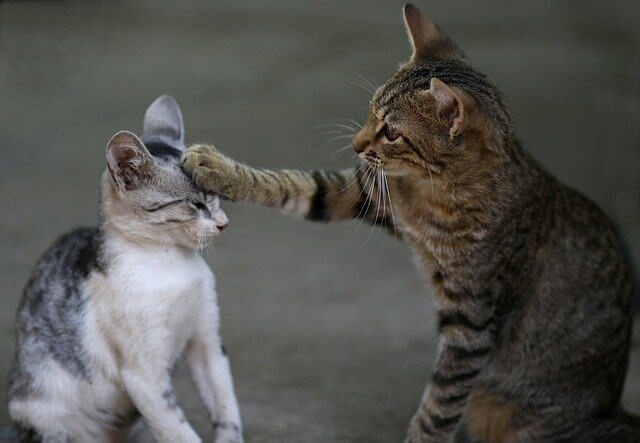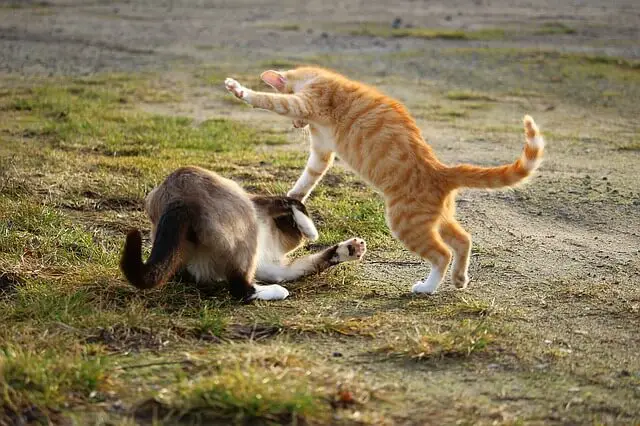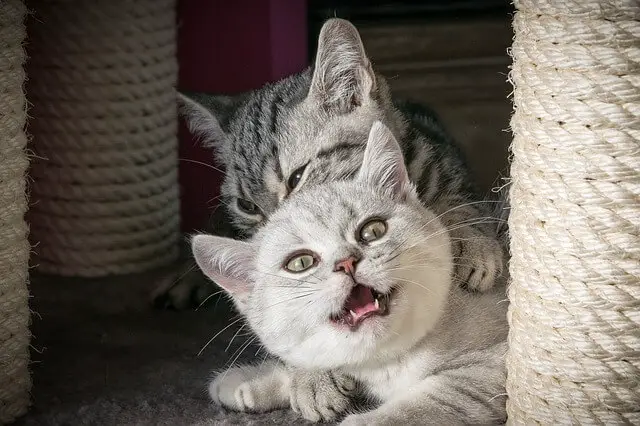Cats in Fight: Why Do Fights Happen and How To Stop Them
08.03.2022.
It’s not uncommon that pet owners want to enjoy the company of more than one cat. In fact, many of us believe the more the cats, the more love that can be spread around. However, when different animals live in the same area, tensions can rise, and sparks fly. Seeing your cat in fights with other pets, both inside and outside their homes, can be stressful. Most of us haven’t really thought about dealing with cat fights when we thought about getting a cat. Nevertheless, seeing cats in a fight is not uncommon, and many cat owners want to know what to do and how to stop them. Here are a few things you should know about it.
Why do cats get into fights?
Before we go into details about this potential problem, you should know that it is possible to stop cats from fighting. There are various short-term and long-term solutions you can implement in your home. Many cat owners automatically think they will have to give up one of their cats. To successfully implement conflict resolution, we need to understand why the conflict happens. In this case, the conflict is your cat in a fight. Here are the most common reasons cats fight;
Territory
Cats are territorial, and like all territorial animals, they will protect what they think is theirs. Your home is a territory full of resources, like food, water, beds, and toys, and your cats believe that territory is worth defending. This is also common in feral cats and domestic cats. Feral cats will often defend their outside territory if your cat accidentally wanders onto it.

RELATED: Why do Cats Knead? What Does Kneading Mean?
Aggression
Some cats are naturally aggressive. Male cats are particularly violent, and they will continue to fight. They can also have dominant tendencies towards female cats. Your cat may need to express their aggressiveness by clashing with their siblings or provoking a conflict with an unfamiliar cat.
Play turns to fights
Cats can play a bit rough, and like with small children, that rough play can sometimes escalate into a fight. Cats are not pack animals like dogs, so they might enjoy being on their own more than in a group. It is not uncommon that cat play turns into a fight that hurts both cats.
Your cats are fighting; what should you do?
When you see your cats fighting, it's impossible not to feel sad for them because you love them so much. Be cautious if your initial reaction is to leap in and separate them. It's possible to get scratches from a cat in that state of mind. As long as you aren't putting yourself in danger, we recommend gently separating them.

Distract the cats
It's possible to divert a cat's attention from the fight by providing a distraction. Play with a toy you know your cat is fond of and create a sound that will immediately attract them. There is a chance that this will bring them to a halt.
Gentle approach
Avoid getting scratched, and don't make your cats more stressed or scared with your approach when intervening in a cat fight. Make sure you don't employ harsh or punishing methods against your cats.
RELATED: 7 Most Common Cat Noises and Their Meaning
Separate them
It's preferable to separate the cats for a period once you've gotten them to stop fighting. Make sure they have access to food, water, a cat bed, and a litter box. Allow some time for everything and everyone to calm down. You may be able to reunite the cats once they appear to have relaxed body language and are no longer anxious.

Once they've calmed down, examine each cat thoroughly for bite wounds or other injuries. Continue to monitor them for the next couple of days. Cat bites can be difficult to detect; nevertheless, when an abscess forms a few days later, they may become apparent as firm swellings. A fever and a loss of appetite are common symptoms of an abscess.
What to do if your cat is fighting with a cat you don’t know?
When your cat is out in the open, they may be assaulted by an unknown cat. There have been reports that a single cat attacks all cats it sees outside. A mild-mannered cat is especially at risk in this situation. These conflicts might result in serious injuries that will require numerous appointments with the veterinarian.
The best thing to do is to keep your cat indoors, especially if you know a cat will attack your cat any time it goes outside. If you're letting them out at nighttime, you should exercise extreme caution.
It is possible to find out whether the other cat belongs to someone and whether that cat can be controlled if you cannot keep your own cat indoors. Another option is to go outside to help your cat if you hear they’re in danger. It's unlikely that you'll need to do anything to end the fight other than show up since most cats will flee the moment they see you.
RELATED: Indoor Vs. Outdoor Cats: Which is Better?
Long-term solution to cat fights
It's possible that you'll need different long-term solutions if your cat is always fighting, whether with other cats in your home or cats from the neighborhood. If your cat is constantly getting into fights, it's possible that they have an excessive amount of aggression, or they may simply be lacking in social skills. Here are some suggestions for long-term care for your cat.
Vet help
Vets say that cats are prone to fighting because of their over-aggressive nature. Aggression like this could be a sign of something more serious. It might be a problem you aren't even aware of. Get your cat checked out by your vet. You can get advice from your veterinarian on the best course of action.

Cat trainer or behaviorist
Animal behaviorists can help if your cat isn't sick but still displays a great deal of unresolved aggressiveness. Cats who often fight can benefit from the expertise of these professionals. They can help your cat learn to better control their aggression.
RELATED: How Long Does a Cat Stay In Heat?
Socialization
Cats quarrel because they haven't been properly socialized. When it comes to getting along with other cats, these felines have no idea what they're doing. Re-socializing these cats may be necessary for them to adapt to their new surroundings. If you want to see if your cat can be trained and socialized, you can enroll them in a cat training class. Alternatively, you can find information in books and videos on how to make your cat get along better with other cats.
In conclusion
Cat fights might be painful to watch, but they can be resolved. When a fight breaks out between your cats, simply follow the advice in this article to try to separate them and end the conflict. As a final option, if the issue is long-lasting, consider one of the long-term solutions mentioned above. Remember that these conflicts may be resolved, and they do not have to drag out and become a long-term issue.
World Cat Finder Team







Share